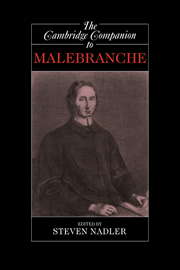Book contents
- Frontmatter
- Introduction
- 1 Malebranche and Method
- 2 Malebranche on the Soul
- 3 Malebranche on Ideas and the Vision in God
- 4 The Malebranche-Arnauld Debate
- 5 Malebranche on Causation
- 6 Metaphysics and Philosophy
- 7 Malebranche's Theodicy
- 8 Malebranche on Human Freedom
- 9 Malebranche's Moral Philosophy
- 10 The Critical Reception of Malebranche, from His Own Time to the End of the Eighteenth Century
- 11 Malebranche's Life and Legacy
- Bibliography
- Index
7 - Malebranche's Theodicy
Published online by Cambridge University Press: 28 May 2006
- Frontmatter
- Introduction
- 1 Malebranche and Method
- 2 Malebranche on the Soul
- 3 Malebranche on Ideas and the Vision in God
- 4 The Malebranche-Arnauld Debate
- 5 Malebranche on Causation
- 6 Metaphysics and Philosophy
- 7 Malebranche's Theodicy
- 8 Malebranche on Human Freedom
- 9 Malebranche's Moral Philosophy
- 10 The Critical Reception of Malebranche, from His Own Time to the End of the Eighteenth Century
- 11 Malebranche's Life and Legacy
- Bibliography
- Index
Summary
The topic of theodicy looms large in Malebranche's thought. His distinctive views on the subject form the basis of one of his most famous books, the Treatise on Nature and Grace (1680), and occupy a prominent place in important later works such as the Dialogues on Metaphysics and Religion (1688). Embracing issues of the relation of the divine will to creation and our knowledge of that will, Malebranche's theodicy is inextricably linked to his signature doctrines of occasionalism and vision in God. Together, they form a single comprehensive theory that attempts to explicate the existence and nature of the world, and the special place of human beings within it, in relation to God as creator.
What has come to be called the problem of theodicy signifies a cluster of issues, some of which any theological explanation of the world's existence must confront, others of which are specifically associated with the tenets of Christian theology. Of the first sort are basic questions about the world's imperfection and what this implies about God's apparent lack of concern for the welfare of human beings. If God is all powerful, all wise, and all good, why does he permit natural circumstances (floods, earthquakes, and drought) that are unworthy of his perfection and that bring harm to human beings, particularly the innocent who have done nothing to earn God's punishment? Why does God allow wicked people to exercise their wickedness in harming the innocent, and then, apparently, fail to punish the wicked, who profit from their evil deeds? Questions such as these strike at the fundamental justice of God's action: How could God allow such things to happen, unless he is in some way limited by less than supreme goodness, knowledge, or power?
- Type
- Chapter
- Information
- The Cambridge Companion to Malebranche , pp. 165 - 189Publisher: Cambridge University PressPrint publication year: 2000
- 6
- Cited by

